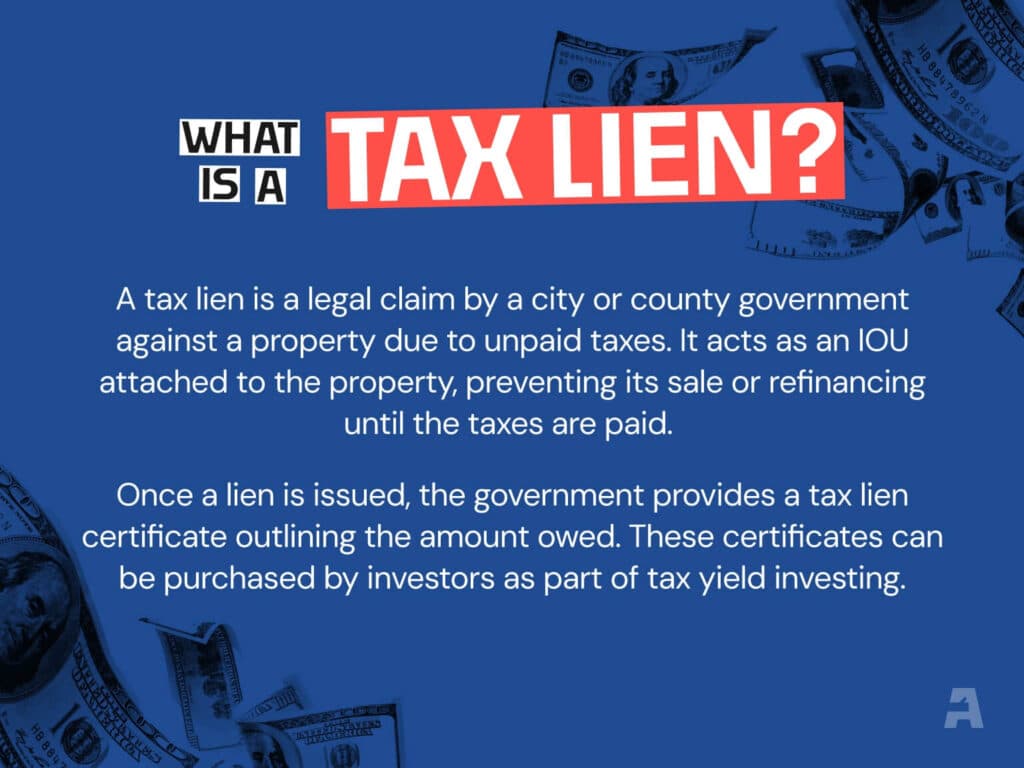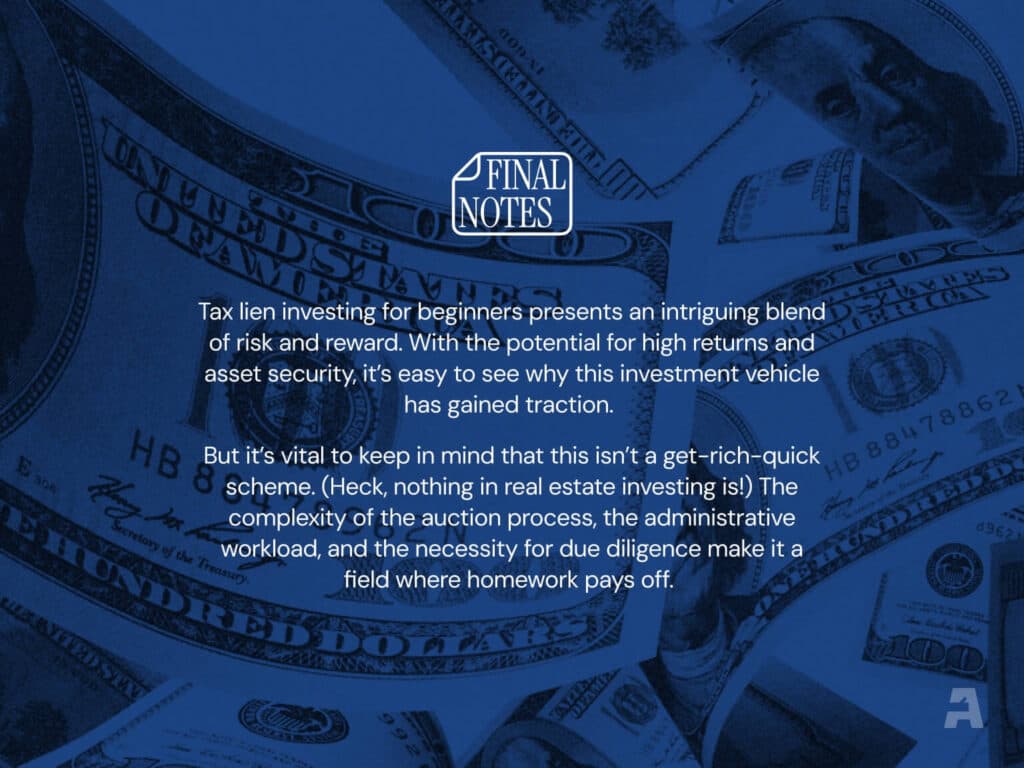Welcome, investor!
If you’re exploring different avenues for diversifying your REI business, boy oh boy have you come to the right place! Today, we’re focusing on tax yield investing… it’s an often overlooked yet potentially profitable sector of real estate investment.
Here, we’ll break down the basics and introduce you to what tax liens are, opening the door to a potentially stable and rewarding investment field. Tax yield investing for beginners, here we come!
But let’s not get ahead of ourselves — first things first…
What Is a Tax Lien?

Tax liens are neither mystical nor terribly complicated…
A tax lien is a legal claim against a property, generally levied when property owners fail to settle their owed taxes.
These liens are initiated by local governmental bodies — either city or county — and they essentially act as an IOU pinned to the property.
It signifies that there are unsettled debts, preventing the property from being sold or refinanced until the outstanding tax amount is paid and the lien is lifted.
Here are some quick bullet points to help encapsulate what a tax lien is:
- Legal claim against a property
- Initiated due to unpaid taxes
- Issued by local government (city or county)
- Blocks property sale or refinancing
See, tax yield investing for beginners ain’t so difficult to understand!
But I digress…
After a lien has been slapped on a property, the government issues what’s known as a tax lien certificate, which outlines the amount owed. Interested in turning this sticky financial situation to your advantage?
Investors can actually acquire these tax lien certificates.
But the big question here is: At what cost? The price point of a tax lien certificate varies and is highly dependent on the specifics of the property.
In a nutshell, tax liens can be your entry ticket to tax yield investing for beginners. They offer a compelling avenue for those willing to understand the ins and outs of the process. Which, as we’re demonstrating, isn’t too hard to learn.
So, now that we’ve laid the groundwork, you’re better positioned to explore this type of investment. As we move forward, we’ll break down tax lien certificates and the inner workings of the process of tax lien investing for beginners.
What Are Tax Lien Certificates?
Stepping into the world of tax yield investing for beginners, you’ll find that tax lien certificates are the bread and butter of this investment strategy.
These tax lien certificates are not just pieces of paper… they represent a legal claim against a property with unpaid taxes. And you can be the one holding that claim. In the event that a property owner falls behind on their taxes, the local government springs into action.
Rather than wait indefinitely for the delinquent taxpayer to catch up, the government will issue a tax lien on the property. This lien serves as a legal claim against the property for the unpaid tax amount.
Alright, tax lien investing for beginner’s foundation is laid, let’s go deer now…
What Is Tax Lien Investing & the Tax Lien Investing Process?
So, as we touched on, tax lien investing is a specialized form of real estate investment focusing on buying tax lien certificates. These certificates come into existence when homeowners fail to pay property taxes, prompting local governments to place a lien on their properties.
Available in 28 states, this market accounts for about $21 billion in delinquent property taxes annually.
With that in mind, take a look at the steps below —we’ve broken them down into 6 easy parts:
- Creation of Certificate: Local governments generate a tax lien certificate outlining unpaid taxes and fees when property taxes are overdue.
- Auction Phase: To quickly recover their funds, governments auction off these tax lien certificates.
- Bidding: Investors bid either on the purchase price of the certificate or the interest rate they’re willing to accept. Competition may drive down potential profits.
- Winning Bid: If you win, you don’t own the property but gain the right to foreclosure or repayment from the homeowner.
- Settling the Debt: After a win, you’re responsible for paying the tax bill and any fees. The homeowner then has a limited redemption period to pay you back.
- Outcome: Either the homeowner pays, earning you a tidy interest rate, or you can initiate foreclosure. Generally, most homeowners settle their tax bills before it comes to that.
For beginners in tax yield investing, this field provides an organized yet adaptable way to diversify your REI business.
But! Rules vary by jurisdiction, so due diligence is crucial.
Pros of Tax Lien Investing
- High Interest Rates: One of the major attractions is the potential for high interest rates, ranging from 8% to a whopping 36%, depending on jurisdiction.
- Secured Investment: You’re basically a priority creditor. If the homeowner pays back the taxes, you get paid first. If they don’t, you have the right to foreclose.
- Diverse Portfolio: With tax lien investing, you can add a new asset class to your portfolio, offering a cushion against market volatility.
- Low Entry Barrier: The cost of entry is generally low compared to other real estate investment opportunities, making it more accessible for novice investors.
Cons of Tax Lien Investing
- Complexity and Learning Curve: The auction process, varying state laws, and understanding lien priorities can take time to grasp, which might be intimidating for beginners.
- Risk of No Payment: While you may have the upper hand legally, there’s always the risk that the property owner won’t pay, leading you down the complex road of foreclosure.
- Illiquidity: These investments are not as liquid as stocks or bonds… you might need to wait until the redemption period passes to see your returns.
- Administrative Hassles: Managing the tax lien certificates, tracking redemption periods, and following legal procedures can be tedious and time-consuming.
Final Thoughts About Tax Yield Investing for Beginners

Tax lien investing for beginners presents an intriguing blend of risk and reward. With the potential for high returns and asset security, it’s easy to see why this investment vehicle has gained traction.
But it’s vital to keep in mind that this isn’t a get-rich-quick scheme. (Heck, nothing in real estate investing is!) The complexity of the auction process, the administrative workload, and the necessity for due diligence make it a field where homework pays off.
If you’re interested in learning more about tax yield investing, check out our Tax Yield online course.
